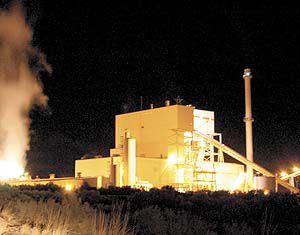| The Sunnyside Co-Generation Plant lights the night sky in East Carbon. Price city recently ratified an agreement that would make them a partner in the IPP unit three project. IPP unit three is scheduled to potentially go online in 2012. The local municipality would own five megawatts of the new unit. |
During Price’s regularly scheduled Feb. 14 council meeting, officials approved a contract for the city’s purchase of five megawatts of electricity from Intermountain Power Project’s unit three.
IPP expects the 900 megawatt unit in Delta to be ready to go online in 2012.
In 2005, IPP gained the air quality permit and unit three was added as a new stand alone project for Utah Associated Municipal Power Systems (UAMPS).
IPP unit three promises to be the coal fired generating facility of the future, indicated UAMPS.
According to the association’s Website, the facility will be equipped with the best air pollution technology available.
“This decision is one that will prove to be progressive in its impact to our city,” pointed out Price community director Nick Tatton at last Wednesday’s council meeting.
“It will insure comparable power costs in our city for the foreseeable future,” added Tatton.
Price is a member of UAMPS, which is an association for local towns that broker electrical power.
The city currently owns one megawatt of power that is produced through IPP.
IPP is operated by the Intermountain Power Agency.
Intermountain Power Agency is a political subdivision of Utah organized in 1977 by 23 municipalities in the state.
IPA’s power project includes a two-unit, coal-fired steam electric generating station with a net capacity of 1,800 megawatts located in Delta.
UAMPS acts as a scheduling agent for the association members who have called back capacity and energy from the project pursuant to the excess power sales agreement in the past.
UAMPS has contracted to be one-half owner of the IPP unit three project.
As a member of the association, Price’s portion of that half is 1.111 percent, equaling five megawatts. Because Price has committed to buy this power they are also responsible for 1.111 percent of the one-half construction costs associated with the new unit. According to Tatton in round figures that will total somewhere around a $10 million obligation to be included in the cost of power when the plant begins commercial operation.
Such a large potential commitment of funds caused some distention among the Price city council. The motion approved the contract, confirmed Nick Tatton as the UAMPS representative as well as approved the certificate of participation and electric systems bond information. City officials passed the motion by a narrow margin three to two.
Dissenting in the vote were Price city councilmembers Rick Davis and Jeff Nielson. Nielson stated that he felt he did not have enough time to review the information concerning the agreement to vote for a contract of this size. And councilmember Rick Davis cited the large potential financial obligation as his reason for a vote of nay.
According to Tatton the city had two payment options available concerning their portion of the debt. The first would have been to bond for the whole of the obligation. The option Price city decided upon will allow them to pay for the power as it is produced and ultimately used.
“Right now this means that we have no immediate out of pocket expense,” said the Price city community director.
Tatton sees the council’s decision as one that will have far reaching economic benefits for Castle Country as a whole.
“IPP unit three will potentially use over three million tons of coal per year, and that coal could come predominantly from Castle Country, continuing to support the base industries in our area. Many jobs can be sustained and created in our community because of this project,” continued Tatton.
Tatton also went on to state that with the city of Price using between 17 and 18 megawatts of power during peak load the city will have no problem using the purchased power.
“This decision will keep the people of Price paying nearly the same prices they are paying now for power in the future on that five megawatts of power, it is a decision made for the people of Price,” concluded Tatton.

